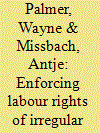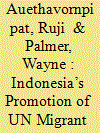| Srl | Item |
| 1 |
ID:
166685


|
|
|
|
|
| Summary/Abstract |
The multi-directional nature of labour migration flows has resulted in an increasing number of countries having become both senders and receivers of regular and irregular migrants. However, some countries continue to see themselves primarily as senders and so ignore their role as a receiving country, which can have negative implications for the rights of migrants in their territory. Using the example of Indonesia, which is State Party to the 1990 UN Convention on the Rights of All Migrant Workers and Their Families, this article demonstrates that irregular migrant workers in this country have the legal right to protection against labour exploitation even when they work despite the government’s prohibition on employment. The article discusses the ‘right to work’ and how international human rights law has translated it into the ‘right to protection from labour exploitation’ for irregular migrants in Indonesia. By way of two case studies about the Indonesian government’s handling of irregular migrants, it shows how it prioritises enforcement of the employment immigration law over labour and employment laws much like countries that have not ratified the ICRMW. It also draws attention to legal protection gaps that emerge for asylum seekers when they are recognised to be genuine refugees.
|
|
|
|
|
|
|
|
|
|
|
|
|
|
|
|
| 2 |
ID:
184240


|
|
|
|
|
| Summary/Abstract |
Scholars have devoted insufficient attention to Indonesia’s foreign policy on migrant worker protection, especially as mobilized in multilateral institutions. This article addresses such knowledge gaps by analyzing why Indonesia has, for almost two decades, persistently promoted the United Nations Migrant Worker Convention in the Association of Southeast Asian Nations (ASEAN) despite constant pushback from migrant-receiving countries. It argues that Indonesia’s persistence is driven by its locally constituted meaning of migrant worker rights. In particular, this article advances the critical norms approach in international relations to demonstrate that its interpretation is influenced by “Indonesia’s normative baggage,” or past experiences with labour migration that have too frequently dealt with the exploitation of Indonesian citizens abroad. This normative baggage in turn shapes the country’s diplomacy and promotion of convention standards deemed appropriate for safeguarding Indonesian migrants in ASEAN. In presenting the argument, this article contributes to the study of labour migration by scrutinizing Indonesia’s foreign policy on migrant protection and unpacking norm interpretation processes that are necessary in international negotiations.
|
|
|
|
|
|
|
|
|
|
|
|
|
|
|
|
| 3 |
ID:
176234


|
|
|
|
|
| Summary/Abstract |
The decline in the smuggling of people from Indonesia to Australia since late 2013 is primarily attributable to unilateral deterrence policies under Australia's Operation Sovereign Borders. When seeking to prevent asylum seekers from coming to Australia to enjoy the right to asylum there, the Australian government has tested a number of deterrent mechanisms that sometimes border on illegality and even state crime. In May 2015, for example, Australian authorities intercepted an Indonesian boat carrying 65 asylum seekers and allegedly paid the six smugglers to return their passengers to Indonesia. In this article, we reconstruct what happened at sea, and put forward a number of arguments that categorise this ‘turnback’ as explicitly-commissioned people smuggling against Indonesia. Our article also points to further implications about looming risks if the policy was to be employed more widely by states in other areas of the world where people cross the sea to seek asylum. Not only would the practice severely undermine international collaborations that have developed to prevent and combat people smuggling, but it would also create additional safety risks for those who are turned back.
|
|
|
|
|
|
|
|
|
|
|
|
|
|
|
|